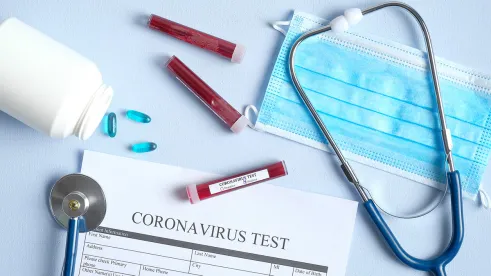The coronavirus is making a significant impact to our daily lives in every respect. This includes a growing impact on the global economy and the day-to-day business activities of pharmaceutical and medical device companies. This legal alert summarizes the evolving situation and its implications on the operations of life sciences companies.
HHS Declaration of Liability Immunity Issued
The U.S. Department of Health and Human Services (“HHS”) released a Declaration under the Public Readiness and Emergency Preparedness Act for Medical Countermeasures Against COVID-19 (the “Declaration”), which provides liability immunity to certain “Covered Persons” against any claim of loss caused by, arising out of, relating to, or resulting from the manufacture, distribution, administration, or use of “Covered Countermeasures.” Claims involving “willful misconduct” are an exception to this immunity. The Declaration is effective retroactively to February 4, 2020 and provides immunity through October 1, 2024.
“Covered Persons” includes manufacturers, distributors, program planners, and qualified persons, and their officials, agents, and employees. “Covered Countermeasures” include “any antiviral, any other drug, any biologic, any diagnostic, any other device, or any vaccine, used to treat, diagnose, cure, prevent, or mitigate COVID-19, or the transmission of SARS-CoV-2 or a virus mutating therefrom, or any device used in the administration of any such product, and all components and constituent materials of any such product.” Examples of covered claims include negligence against a manufacturer in developing a vaccine or a negligence claim against a health care professional for prescribing the wrong dose of a Covered Countermeasure.
The Declaration provides liability immunity “without geographic limitation,” including claims related to the administration or use of Covered Countermeasures in countries outside the U.S., which are often resolved under U.S. law.
Covered Persons involved in Covered Countermeasures should carefully review the Declaration to consider its implications.
Field-Based Employees of Life Sciences Companies Impacted by “Social Distancing” Requirements
Social distancing policies adopted by national, state, and local leaders, as well as hospitals, nursing homes, and other health care facilities, have impacted face-to-face interactions typically conducted by sales representatives, medical science liaisons, and other field-based employees of pharmaceutical and medical device companies.[1] This has resulted in companies adopting other work-at-home measures to address these challenges, including the use of videoconferencing and other marketing tools.
It is critical for company personnel to adopt clear guidelines to manage the legal and compliance challenges with these evolving technologies and new interactions. Key challenges include accurate tracking of alternate interactions, methods to use and disseminate only company-approved materials via company-approved means, controls around social media, and compliance auditing/monitoring activities during this critical period.
FDA Adopts Measures to Address Drug and Medical Supply Shortages
Anxiety regarding the availability of drugs, devices and medical supplies, including face masks, hand sanitizer, and testing kits, continues to rise as the coronavirus pandemic continues. The FDA recently stated that it is “closely monitoring the supply chain with the expectation that the COVID-19 outbreak would likely impact the medical product supply chain, including potential disruptions to supply or shortages of critical medical products in the U.S.”
This has led the U.S. Food and Drug Administration (“FDA”) to ease relevant policies. For example, the FDA released a Policy for Temporary Compounding of Certain Alcohol-Based Hand Sanitizer Products During the Public Health Emergency to allow licensed pharmacists and facilities to prepare alcohol-based hand sanitizers for use by consumers. This policy is in effect for the duration of the public health emergency. The FDA also recently updated its list of extended use dates through which some products may be used beyond the manufacturer’s labeled expiration date to assist with drug shortages.
Manufacturers should actively evaluate their entire supply chain, including any components that may be impacted by manufacturing and supply activities outside the U.S. Manufacturers also should ensure they comply with FDA requirements for reporting drug shortages and delays.
[1] See, e.g., https://www.cms.gov/files/document/3-13-2020-nursing-home-guidance-covid-19.pdf; https://www.ahcancal.org/facility_operations/disaster_planning/Documents/Update%204%20COVID.pdf.



 />i
/>i

